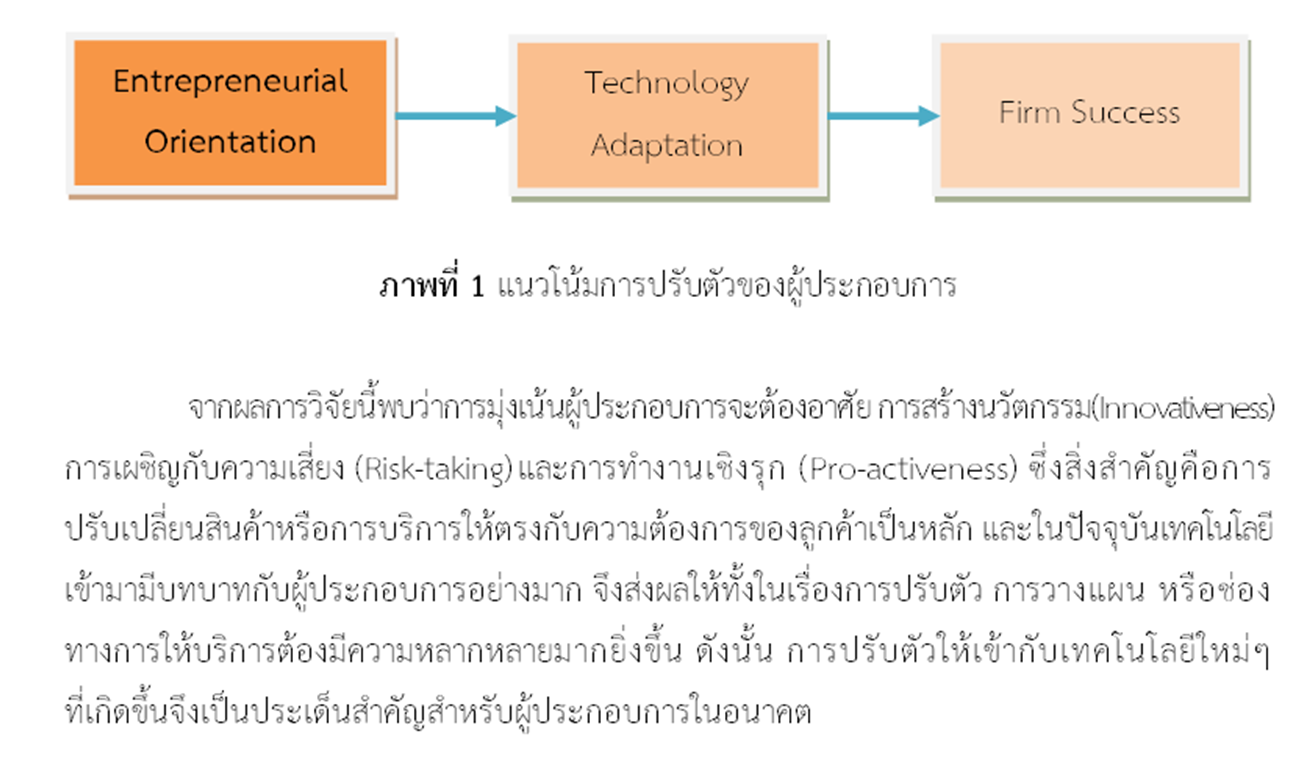ENTREPRENEURIAL ORIENTATION EFFECT ON SMALL AND MEDIUM ENTERPRISES SUCCESS IN NORTHERN THAILAND
Main Article Content
Abstract
The objectives of this research article were 1) to study the importance of entrepreneurial orientation and the successes of SMEs in the northern region, and 2) to study the entrepreneurial orientation that consists of innovativeness, risk-taking and pro-activeness on the successes of SMEs entrepreneurs in the northern region. In this research, A sample of 174 entrepreneurs SMEs in Northern. The data were analyzed by Confirmatory Factor Analysis (CFA), Multicollinearity Test, and structural equation model (SEM).
The research was found that; 1. Entrepreneurial orientation of SMEs entrepreneurs in the northern region. All variables have a relationship. Moreover, Risk-taking, Pro-activeness and innovativeness are affected the success of business. 2. The results of theoretical framework analysis and the empirical data are consistent. The results of the research can be used as information for development assessing the situation in business and used in strategic planning to create a competitive advantage in business.
Article Details

This work is licensed under a Creative Commons Attribution-NonCommercial-NoDerivatives 4.0 International License.
References
กรมพัฒนาธุรกิจการค้า. (2563). ข้อมูลจำนวนและรายชื่อผู้ประกอบการ SMEs จดทะเบียน. สืบค้นเมื่อ 3 ธันวาคม 2563. จาก https://www.dbd.go.th/
ชุติกาญจน์ ทัพเจริญ, สุจินดา โพธิ์ไพฑูรย์ และ ปกรณ์ สัจจพงษ์. (2019). การมุ่งเน้นการเป็น ผู้ประกอบการที่โดดเด่นกับผลประกอบการบริษัทของอุตสาหกรรมเครื่องมือแพทย์ของไทย. Executive Journal. 39(2). 38-51.
ถนอมนวล ลีกลุพิทักษ์. (2560). องค์ประกอบของความเป็นผู้ประกอบการองค์กรธุรกิจไม้ยางพาราในประเทศไทย. วิทยานิพนธ์หลักสูตรปรัชญาดุษฎีบัณฑิต สาขาวิชาการจัดการภาครัฐและเอกชน. นครปฐม : คณะสหวิทยาการ มหาวิทยาลัยคริสเตียน.
ภัทริกา ชิณช่าง. (2020). การมุ่งเน้นความเป็นผู้ประกอบการและความได้เปรียบทางการแข่งขัน อย่างยั่งยืนงานวิจัยเชิงประจักษ์ของธุรกิจส่งออกเฟอร์นิเจอร์ในประเทศไทย. JOURNAL OF SOUTHERN TECHNOLOGY. 13(1). 108-120.
รัชศิชภ ธีรัชต์กุล. (2552). ความสัมพันธ์ระหว่างการเพิ่มคุณค่าให้แก่ลูกค้ากับผลการดำเนินงานของบริษัทประกันในภาคตะวันออกเฉียงเหนือ. วิทยานิพนธ์บริหารธุรกิจมหาบัณฑิต สาขาวิชาการจัดการ. มหาสารคาม : มหาวิทยาวิทยาลัยมหาสารคาม.
ศิริวัฒน์ ตั้งทรงเจริญ. (2558). คุณลักษณะของการเป็นผู้ประกอบการของนักศึกษาระดับปริญญาโท ด้านบริหารธุรกิจในเขตกรุงเทพมหานคร. การค้นคว้าอิสระหลักสูตรบริหารธุรกิจมหาบัณฑิต. คณะพาณิชยศาสตร์และการบัญชี : มหาวิทยาลัยธรรมศาสตร์.
สถาบันพัฒนาวิสาหกิจขนาดกลางและขนาดย่อม. (2562). ธุรกิจขนาดกลางและขนาดย่อม. สืบค้นเมื่อ 1 ธันวาคม 2563. จาก https://ismed.or.th/insti.php
เสรี พงศ์พิศ. (2562). วิสาหกิจขนาดกลางและขนาดย่อม. สืบค้นเมื่อ 23 ธันวาคม 2563. จาก http:// www.personel.cdd.go.th/GroupJob/banju/webpage1/SME.htm
อาจารีย์ เจียรศิริสมบูรณ์. (2552). ความสัมพันธ์ระหว่างการประชาสัมพันธ์เชิงกลยุทธ์กับผลการดำเนินงานของธุรกิจเครื่องดื่มในประเทศไทย. วิทยานิพนธ์บริหารธุรกิจมหาบัณฑิต สาขาวิชาการจัดการ. มหาสารคาม : มหาวิทยาวิทยาลัยมหาสารคาม.
Altinay, L., Madanoglu, M., De Vita, G., Arasli, H., &Ekinci, Y. (2016). The interface between organizational learning capability, entrepreneurial orientation, and SME growth. Journal of Small Business Management. 54(3). 871-891.
Corbett, A. C. (2005). Experiential learning within the process of opportunity identification and exploitation. Entrepreneurship theory and practice. 29(4). 473-491.
Covin, J.G., & Lumpkin, G.T. (2011). Entrepreneurial orientation theory and research: Reflections on a needed construct. Entrepreneurship Theory and Practice. 35(5). 855–872.
Covin, J.G., Green, K.M., &Slevin, D.P. (2006). Strategic process effects on the entrepreneurial orientation sales growth rate relationship. Entrepreneurship Theory and Practice. 30(1). 57–81.
Davidsson, P., Delmar, F., &Wiklund, J. (2002). Entrepreneurship as growth: Growth as entrepreneurship. In M.A. Hitt, R.D. Ireland, S.M. Camp, & D.L. Sexton (Eds.), Strategic entrepreneurship: Creating a new mindset. Oxford : Blackwell.
Frese, Michael. (2000). Success and Failure of Micro business Owners in Africa : A Psychological Approach. United States of America : Greenwood Publishing Group.
Hair, J., Black, W., Babin, B., & Anderson, R. (2019).Multivariate Data Analysis: A Global Perspective. 8th ed. New Jersey : Pearson Prentice Hall.
Hessels, J., Grilo, I., Thurik, R., & van der Zwan, P. (2011). Entrepreneurial exit and entrepreneurial engagement. Journal of Evolutionary Economics. 21(3). 447-471.
Ireland, R. D., Hitt, M. A., &Sirmon, D. G. (2003) . A model of strategic entrepreneurship: The construct and its dimensions. Journal of Management. 29(6). 963-989.
Ismail, N. Z. F., & Mohamad, M. R. (2020). Entrepreneurial Skills and Business Success in the Informal Sector: A Qualitative Study. Journal of Business Management and Accounting. 5(2). 105-122.
Kevill, A., Trehan, K.,&Easterby-Smith, M. (2017). Perceiving ‘capability’ within dynamic capabilities: The role of owner-manager self-efficacy. International Small Business Journal. 35(8). 883-902.
Lumpkin, G.T., &Dess, G.G. (1996). Clarifying the entrepreneurial orientation construct and linking it to performance. Academy of Management Review. 21(1). 135-172.
Minzberg, H. (2004). Managers Not MBAs. San Francisco, CA : Berrett-Koehler.
Nunnally, J. C., & Bernstein, I. H. (1994). Psychometric theory. 3rd ed. New York : McGraw-Hill.
Reuber, A. R., & Fischer, E. (1999). Understanding the consequences of founders' experience. Journal of Small Business Management. 37(2). 30-45.
Turner, R. C., & Carlson, L. (2003). Indexes of item-objective congruence for multidimensional items. International Journal of Testing. 3(2). 163-171.
Weerawardena, J., & Mort, G. S. (2012). Competitive strategy in socially entrepreneurial nonprofit organizations: Innovation and differentiation. Journal of Public Policy & Marketing. 31(1). 91-101.


